Last month, undergraduate students at Princeton University voted on a referendum sponsored by the president of the Princeton Committee on Palestine (PCP). It called upon the University to end its use of Caterpillar construction equipment on campus due to the corporation’s alleged “role... in the mass demolition of Palestinian homes.” In its explanation, the resolution explicitly linked itself to the aims of the national Boycott, Divestment and Sanctions (BDS) movement.
Ultimately, 56% of Princeton undergraduates refused to support the referendum. As president of Tigers for Israel, Princeton’s premier pro-Israel student organization, I witnessed this referendum inflame the campus discourse, malign good-faith student actors and singlehandedly target the Jewish state through a duplicitous agenda.
Weeks after the election drew to a close, Eric Periman, the president of PCP, penned an op-ed in which he shamelessly attempts to rewrite the history of the past few months.
He writes, “[t]he referendum was very simple. It called on my school, Princeton University, to boycott the construction company Caterpillar.” For PCP to conceal their referendum’s direct connection to BDS – a movement rife with antisemitism and predicated upon the erasure of the Jewish connection to the land of Israel – is purely dishonest.
Furthermore, Periman falsely claims that the referendum successfully passed, but this is simply not the case.

Over the course of the campaign, opposition efforts received information from the chief undergraduate elections official that abstention votes would factor into the total vote count. This meant that any passage of the referendum would require the number of yesvotes to exceed the combined number of no and abstain votes.
When the votes were counted, just 44% of student voters supported the measure. At that point, election administrators determined that abstain votes would not factor into the total vote, undermining clearly established expectations. We hold true that the Undergraduate Student Government (USG)’s inconsistency resulted from an honest mistake and did not in any way stem from administrative efforts to tamper with the referendum’s outcome.
Recognizing that this misstatement materially affected the course of opposition campaigning and the referendum’s outcome, USG’s senate overwhelmingly approved an appeal alleging that the election was unfair. Thereafter, USG published a statement of no finding concerning the resolution and University President Christopher Eisgruber thankfully denounced the promulgation of the referendum, arguing in his formal response that “[s]ome issues are ill-suited to decision by referenda.”
In other words, the BDS referendum failed to pass. The pro-Palestinian group even acknowledged to The Daily Princetonian that USG did “not declar[e] a clear winner in this referendum election.” Periman’s false attestation of victory, seen as well on PCP’s official Instagram account, contradicts both reality and his own previous statements.
As an unfortunate side effect of the heated campus climate, members of the election administration were targeted by independent outside actors. Several Princetonians accused opposition-aligned students such as myself of actively endangering the safety of these administrators, due to the actions of external entities that bore no relation to student efforts.
THESE CLAIMS are categorically false. Throughout the campaign and its aftermath, I and other leaders of opposition efforts condemned in no uncertain terms all attacks on student election administrators. For the referendum’s proponents to conflate principled student opposition efforts with extraneous groups and outside attacks on USG members is woefully inaccurate and defamatory.
BDS referenda stake out their presence on American university campuses in an eerily formulaic manner. By either wholly or tacitly acknowledging their relationship to the broader BDS movement, tethering themselves to progressive social causes, and disregarding their outsized effect on the safety of Jewish students, BDS-aligned resolutions run amok through college campuses with little institutional resistance.
As BDS has become increasingly normalized at institutions of higher education, Jewish students are oftentimes pressured to interpret BDS referenda at face value, dismissing their harmful underpinnings to maintain social comfortability. Meanwhile, when BDS-aligned resolutions pass, often with low student turnout and little contextual engagement, the broader movement strengthens and compounds, turning immediately to its next institutional target.
It is evident that proponents of BDS will distort reality to claim victory. When Jewish and Zionist students band together with courage and tenacity in the face of BDS, as has been done twice at Princeton within the past eight years, we emerge triumphant. In doing so, we uphold the legitimacy of our people, our heritage, and the State of Israel, which has been disproportionately targeted by radical actors around the world.
For too long, tertiary institutions have remained complacent amidst the blatant Jew-hatred of the BDS movement. At Princeton, we demonstrated how students can successfully fight back. Now it’s time to continue the charge.
The writer is a student at Princeton University who can be reached at jaredstone@princeton.edu
